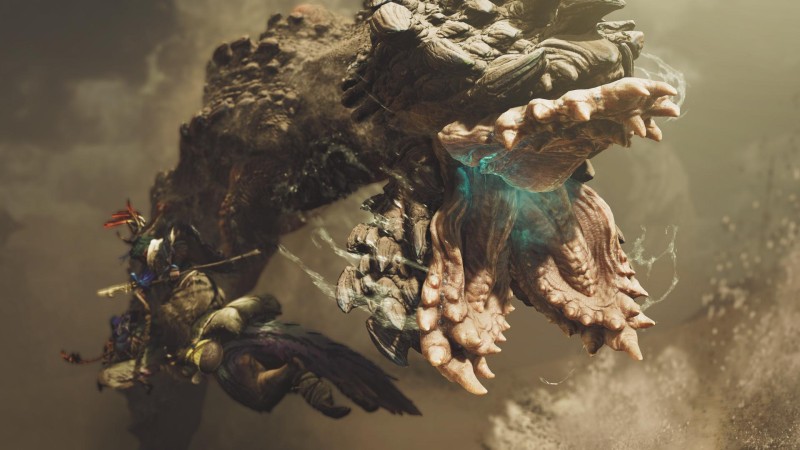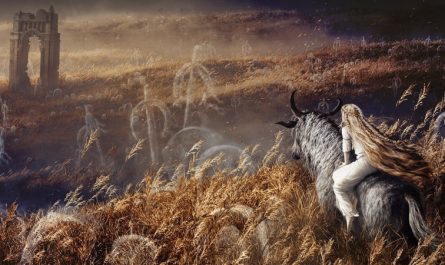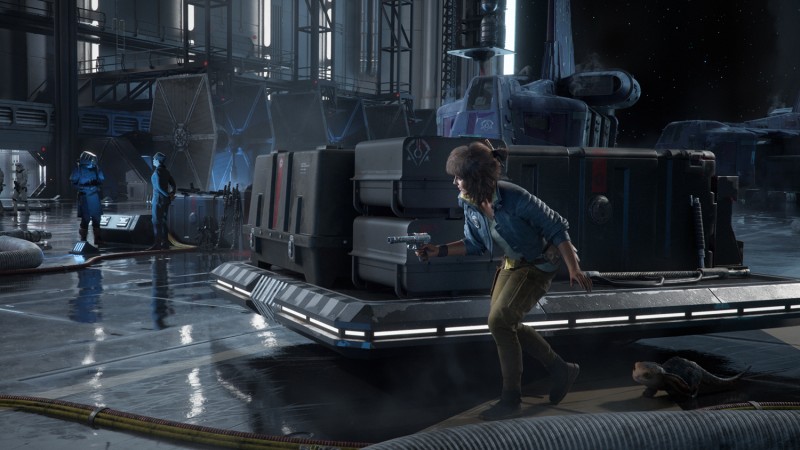Platform:
PlayStation 5, Xbox Series X/S, PC
Publisher:
Capcom
Developer:
Capcom
Release:
2025
Monster Hunter is known for its protagonists overcoming seemingly insurmountable odds in their pursuit of taking down the massive monsters that populate the region, but with Monster Hunter Wilds, Capcom may be taking it to a whole new level. While at Summer Game Fest Play Days, I took in an extended gameplay demo involving an Alpha Monster hunt. I left the demo excited to dive into this seemingly improved take on what the very popular Monster Hunter World delivered in 2018.
Monster Hunter World served as Capcom’s big push into making a more mainstream and globally appealing entry in the franchise. The team worked hard to bring the franchise up to global triple-A standards and included several quality-of-life improvements, as well as a simultaneous ship date across Japanese and Western markets and additional language localizations. The result was a smash success, with Monster Hunter World currently sitting atop the franchise’s sales charts. Capcom and the Monster Hunter development team hope to go even bigger with Wilds.
“For Monster Hunter Wilds, it’s pretty much a similar approach to what we have accomplished with World in that we want to use what were then the most high-spec machines available to create the world of Monster Hunter in unprecedented detail and depth,” series producer Ryozo Tsujimoto says. “That was true for Monster Hunter World, and for Monster Hunter Wilds, it’s the same approach, but now, hardware has advanced so much in the intervening years that we’re just able to go even further than we did in that direction.”
From the start of the demo, the graphical enhancements are obvious. The lush environments, improved animations, and better faces are immediately evident as the on-screen character walks through the base camp populated with humans and Palico, but once the character hops on his mount (which are larger this time around), Wilds really starts cooking with gas.
A new tool that allows players to pick up items from a distance while riding a mount is just the start, as we have our eyes on hunting an Alpha Doshaguma. Venturing out into the eponymous wilds from base camp requires no load screen, and thanks to the day/night cycle, players must be intentional about when they start their hunts since certain monsters only appear at specific times. Because of this, the character must wait for prime Doshaguma hunting hours, so he asks his Palico friends to set up a mobile camp in the field. These camps are extremely handy, but they can be destroyed by monsters, so you must be strategic about your placement.
Before the hunt, the character cooks a meal via an extended cooking sequence that is, in the words of the demo’s commentator, quite sensual. The detailed food looks terrific, and the character’s facial expressions and sounds seem to reflect that it tastes as good as it looks. After feasting, the hunter is off to find the Doshaguma. Using the Ghille Mantle, the hunter sneaks right past the standard monsters and right up to the Alpha. He lands a heavy blow, and all chaos breaks loose. The giant bear-like monster alerts all its buddies, and they swarm the hunter in the enclosed space.
The only way the hunter is going to survive this is by trying to thin the herd, but that’s not going to happen in this tight space. The hunter calls upon his mount and makes a break for it. The four congregated monsters give chase. While they’re hot on your tail, you have ways to slow them down or even take them out of the fight. You can lead them through Bramble or even other monsters’ territory. In this case, the demo player leads them right through a pack of smaller monsters who don’t hesitate to jump up on the four Doshaguma. This slows them down, but two stay on the hunter’s trail.
After a few more maneuvers, the hunter loses all of the Doshaguma except the Alpha target. Now it’s time to lead it through even more traps in hopes of slowing it down and landing some damage. First, the hunter leads them through Balahara territory, which results in the Balahara opening up a quicksand trap that sucks the Doshaguma into it. The bear-like monster escapes, so the hunter enters a nearby thunderstorm. There, the area’s Apex monster appears and attacks the Doshaguma but does not finish it off. The hunter then rides into a nearby cave where boulders crash onto the monster from the ceiling.
It’s obvious that having knowledge of the map will pay dividends as you fight a powerful monster like this Alpha Doshaguma. “With the maps being so much bigger now – two times or more as large as Monster Hunter World – being completely seamless, my approach is to give the player as wide a toolset as possible and place these things so that they can make a choice on what kind of strategy they want to take,” director Yuya Tokuda says. “This is a game you can play for dozens or hundreds of hours, and even though it’s very big, you will see the same field so many times, and I don’t want it to feel static, but we always have our, ‘I know that if I go here, this is what happens. That’s option A, and there’s also option B: The way the field actually changes with the daylight cycle and extreme weather system means that you are always able to, ‘Okay, well now that it’s this time of day, if I go here, I know that [a particular monster] will be available for me to track. Or for the next time when it’s a different time of day or different weather option, we’ve provided the information to let you decide how to take it differently this time. You can go through your old favorite strategies or just decide to change it up on a whim. I feel my job as the director or the designer is to give you the tools you need to hunt. How you use them is really up to you.”
To prevent players from feeling overwhelmed by the options available to them, the Palico, who can talk this time around, will call things out to ensure the player is aware of what is at their fingertips. “They will call out these things just to make you aware of them, but it doesn’t force you to do them,” Tokuda says. “So, if there’s a storm coming in, then one of the characters might tell you to watch out for that. […] I just want to ensure that the players don’t miss out on all the exciting new features we added because they didn’t know what to look out for.”
After the chase through the cave, the Alpha Doshaguma begins limping, but the hunter also needs to rest, so he lets the monster escape. The hunter returns to the mobile camp, changes to a long sword, and sends up a signal flare to call co-op partners. Together, they set up traps in the area where the monster roams. One hunter lays a pitfall trap while the others prepare their own ways. Once ready, our main hunter sneaks up on the Doshaguma and sets up explosive barrels near where it’s sleeping. The hunter blasts the barrels, and they explode, serving as the rudest alarm clock. It wakes up, understandably irritated, and chases the hunters once more. The main hunter leads it into the pitfall trap, where it gets wedged in the ground, and the team unloads on the already-injured beast. The Doshaguma climbs out, but the main hunter jumps on its back, grabs its mane, and begins stabbing it from the top. Thanks to this maneuver, the pre-existing injuries from the thrilling chase, and the teamwork from the co-op partners, the Alpha Doshaguma finally falls, and the hunters use the carving knife to cut the carcass. The entire sequence was white-knuckled, breathless, and edge-of-my-seat thrilling, and I can’t wait to undertake similar chases once I have the game in my possession.
When Monster Hunter World arrived in 2018, I was excited to finally give the series a shot. I liked what I played, but I didn’t make it very far into the campaign. After leaving my Monster Hunter Wilds demo and speaking with the creators, I am ready to download World and its Iceborne expansion in anticipation of Monster Hunter Wilds’ 2025 release.
PurchasePlatform:
PlayStation 5, Xbox Series X/S, PC
Publisher:
Capcom
Developer:
Capcom
Release:
2025
Monster Hunter is known for its protagonists overcoming seemingly insurmountable odds in their pursuit of taking down the massive monsters that populate the region, but with Monster Hunter Wilds, Capcom may be taking it to a whole new level. While at Summer Game Fest Play Days, I took in an extended gameplay demo involving an Alpha Monster hunt. I left the demo excited to dive into this seemingly improved take on what the very popular Monster Hunter World delivered in 2018.
Monster Hunter World served as Capcom’s big push into making a more mainstream and globally appealing entry in the franchise. The team worked hard to bring the franchise up to global triple-A standards and included several quality-of-life improvements, as well as a simultaneous ship date across Japanese and Western markets and additional language localizations. The result was a smash success, with Monster Hunter World currently sitting atop the franchise’s sales charts. Capcom and the Monster Hunter development team hope to go even bigger with Wilds.
“For Monster Hunter Wilds, it’s pretty much a similar approach to what we have accomplished with World in that we want to use what were then the most high-spec machines available to create the world of Monster Hunter in unprecedented detail and depth,” series producer Ryozo Tsujimoto says. “That was true for Monster Hunter World, and for Monster Hunter Wilds, it’s the same approach, but now, hardware has advanced so much in the intervening years that we’re just able to go even further than we did in that direction.”
From the start of the demo, the graphical enhancements are obvious. The lush environments, improved animations, and better faces are immediately evident as the on-screen character walks through the base camp populated with humans and Palico, but once the character hops on his mount (which are larger this time around), Wilds really starts cooking with gas.
A new tool that allows players to pick up items from a distance while riding a mount is just the start, as we have our eyes on hunting an Alpha Doshaguma. Venturing out into the eponymous wilds from base camp requires no load screen, and thanks to the day/night cycle, players must be intentional about when they start their hunts since certain monsters only appear at specific times. Because of this, the character must wait for prime Doshaguma hunting hours, so he asks his Palico friends to set up a mobile camp in the field. These camps are extremely handy, but they can be destroyed by monsters, so you must be strategic about your placement.
Before the hunt, the character cooks a meal via an extended cooking sequence that is, in the words of the demo’s commentator, quite sensual. The detailed food looks terrific, and the character’s facial expressions and sounds seem to reflect that it tastes as good as it looks. After feasting, the hunter is off to find the Doshaguma. Using the Ghille Mantle, the hunter sneaks right past the standard monsters and right up to the Alpha. He lands a heavy blow, and all chaos breaks loose. The giant bear-like monster alerts all its buddies, and they swarm the hunter in the enclosed space.
The only way the hunter is going to survive this is by trying to thin the herd, but that’s not going to happen in this tight space. The hunter calls upon his mount and makes a break for it. The four congregated monsters give chase. While they’re hot on your tail, you have ways to slow them down or even take them out of the fight. You can lead them through Bramble or even other monsters’ territory. In this case, the demo player leads them right through a pack of smaller monsters who don’t hesitate to jump up on the four Doshaguma. This slows them down, but two stay on the hunter’s trail.
After a few more maneuvers, the hunter loses all of the Doshaguma except the Alpha target. Now it’s time to lead it through even more traps in hopes of slowing it down and landing some damage. First, the hunter leads them through Balahara territory, which results in the Balahara opening up a quicksand trap that sucks the Doshaguma into it. The bear-like monster escapes, so the hunter enters a nearby thunderstorm. There, the area’s Apex monster appears and attacks the Doshaguma but does not finish it off. The hunter then rides into a nearby cave where boulders crash onto the monster from the ceiling.
It’s obvious that having knowledge of the map will pay dividends as you fight a powerful monster like this Alpha Doshaguma. “With the maps being so much bigger now – two times or more as large as Monster Hunter World – being completely seamless, my approach is to give the player as wide a toolset as possible and place these things so that they can make a choice on what kind of strategy they want to take,” director Yuya Tokuda says. “This is a game you can play for dozens or hundreds of hours, and even though it’s very big, you will see the same field so many times, and I don’t want it to feel static, but we always have our, ‘I know that if I go here, this is what happens. That’s option A, and there’s also option B: The way the field actually changes with the daylight cycle and extreme weather system means that you are always able to, ‘Okay, well now that it’s this time of day, if I go here, I know that [a particular monster] will be available for me to track. Or for the next time when it’s a different time of day or different weather option, we’ve provided the information to let you decide how to take it differently this time. You can go through your old favorite strategies or just decide to change it up on a whim. I feel my job as the director or the designer is to give you the tools you need to hunt. How you use them is really up to you.”
To prevent players from feeling overwhelmed by the options available to them, the Palico, who can talk this time around, will call things out to ensure the player is aware of what is at their fingertips. “They will call out these things just to make you aware of them, but it doesn’t force you to do them,” Tokuda says. “So, if there’s a storm coming in, then one of the characters might tell you to watch out for that. […] I just want to ensure that the players don’t miss out on all the exciting new features we added because they didn’t know what to look out for.”
After the chase through the cave, the Alpha Doshaguma begins limping, but the hunter also needs to rest, so he lets the monster escape. The hunter returns to the mobile camp, changes to a long sword, and sends up a signal flare to call co-op partners. Together, they set up traps in the area where the monster roams. One hunter lays a pitfall trap while the others prepare their own ways. Once ready, our main hunter sneaks up on the Doshaguma and sets up explosive barrels near where it’s sleeping. The hunter blasts the barrels, and they explode, serving as the rudest alarm clock. It wakes up, understandably irritated, and chases the hunters once more. The main hunter leads it into the pitfall trap, where it gets wedged in the ground, and the team unloads on the already-injured beast. The Doshaguma climbs out, but the main hunter jumps on its back, grabs its mane, and begins stabbing it from the top. Thanks to this maneuver, the pre-existing injuries from the thrilling chase, and the teamwork from the co-op partners, the Alpha Doshaguma finally falls, and the hunters use the carving knife to cut the carcass. The entire sequence was white-knuckled, breathless, and edge-of-my-seat thrilling, and I can’t wait to undertake similar chases once I have the game in my possession.
When Monster Hunter World arrived in 2018, I was excited to finally give the series a shot. I liked what I played, but I didn’t make it very far into the campaign. After leaving my Monster Hunter Wilds demo and speaking with the creators, I am ready to download World and its Iceborne expansion in anticipation of Monster Hunter Wilds’ 2025 release.
PurchaseRead MoreGame Informer



